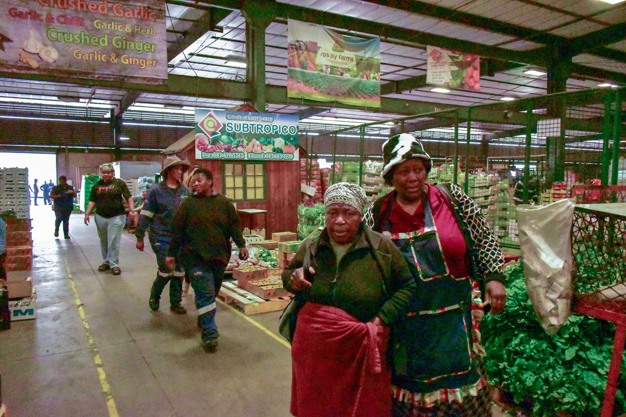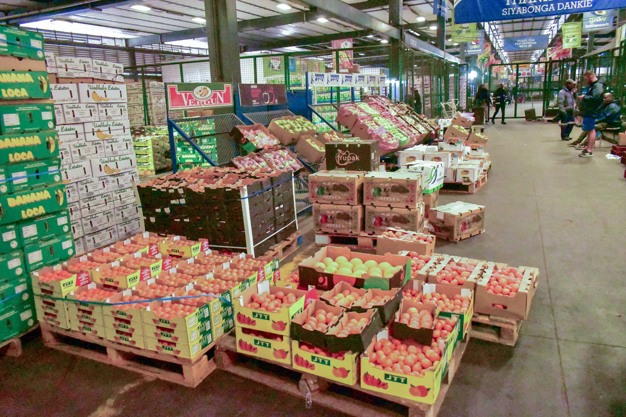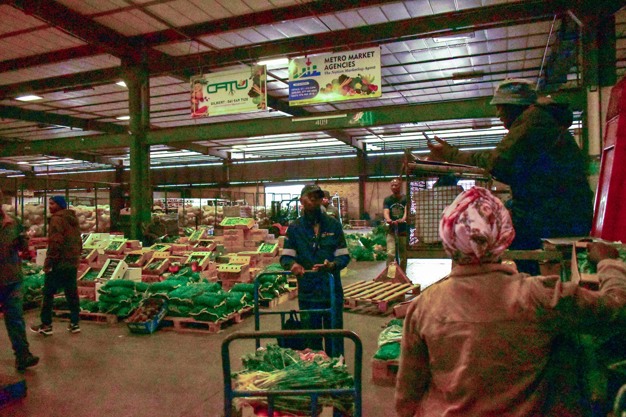The Johannesburg fresh produce market seeks investment to realise their ambition of a 20% revenue increase over the coming five years, provided they can secure funding for the recapitalization of infrastructure which has reached the end of its lifespan, says Sello Makhubela, acting CEO, as well as for new facilities. "We've always wanted to be a one stop shop through diversification."
Monthly trading revenues hover around the billion Rand mark; occasionally, as during this past August, exceeding that figure. Not driven by greater trading volumes but, in fact, the opposite: over August 2023 and August 2024, tonnage of traded fresh produce dipped by 3%, yet revenues increased by R33.7 million, so that this past August became the third month in less than a year to in over a billion Rands (almost 52 million euros), driven to a large degree by the current potato price of R105 (5.4 euros) per 10kg bag.
View the photo report of FreshPlaza's visit to the Joburg Market
Lesego Seyama, acting senior manager for commercial services who has worked at the market for eighteen years, remarks that the potato hall has been noticeably emptier since the severe frost of July.
Millions depend on this market – the vegetables sold outside Baragwanath Hospital, Africa's largest hospital, are early-morning procured in City Deep, or those vended in the adjacent inner-city and further afield in the well-stocked greengrocers of Johannesburg's suburbs.
The secondary market where produce is sold in smaller repackaged portions and for cash (not a buyer's card) is since last year called the Tshiamo Market (it used to be the Mandela Market) in a renovated section with a festive atmosphere where music plays and 180 small-scale traders ply their business.
At the adjacent Tshiamo Market, produce is sold for cash in smaller packaging
Between 11,000 and 14,000 daily buyers
A fifth of the buyers coming to City Deep, Johannesburg, have driven here from across the border to buy fruit and vegetables, some over several international borders.
"We have the feet – between 11,000 and 14,000 buyers come here daily," Noxolo Mabuza, acting executive manager for strategy and transformation points out. Between 8,000 and 9,000 delivery vehicles come through these gates every month. "Farmers are guaranteed that their produce will be sold and that they'll get their money within three days."
View the photo report of FreshPlaza's visit to the Joburg Market
Therefore, Mabuza says, farmers are bringing more and the market needs increased floor space to welcome more traders. However, the market's capex budget has dropped significantly since the previous financial year: from R121 million in 2023 to R89 million (4.6 million euros) this year. When the Competition Commission's final report is ready, they will be submitting its proposal to ring-fence the market's revenues - 5% in commission on R11.2 billion (580 million euros) over the previous financial year – to municipal authorities.
Recapitalisation of the market will require a hefty amount of financing, around R2.8 billion they reckon, and they're open to exploring financial models with the Development Bank of South Africa to realise their ambitions to expand the precinct to a one-stop food hub with agro processing add-ons and additional venues like a conference centre.
Investment in electricity and water security
As it is, Mabuza remarks, they do the most with what they have: new cold rooms for an additional 1,500 pallets will be commissioned in February and March of 2025. New and redesigned truck loading bays are currently added, and many buildings recently received a fresh lick of paint.
They show the strides recently made: the Genfarm, a collection of diesel generators costing R32 million (1.6 million euros) to cope with load shedding from which the market is not exempt and three water tanks of a million cubic litres each, to safeguard against a newer Gauteng problem called water shedding.
Multiple generators augmented by 1MW of photovoltaic capacity protect the market against power cuts
The market belongs to the City of Johannesburg in a corporate model that differs from the other municipal markets in South Africa. Mabuza insists they don't allow turmoil in the city's politics to impede the functioning of the market.
View the photo report of FreshPlaza's visit to the Joburg Market
"If you're complaining, it means you care"
Mabuza remarks that some of the feedback they get from their stakeholders, to whom their door is always open, can be quite brutal but they view it philosophically. "If you're complaining, it means you care," she says, and these conversations feed into their "all-hands-on-deck" maintenance programme. "The agents are our most important customer. We do not dismiss their complaints."
She adds: "This is about food security. You can't wait for political stability. We've always been the destination of choice for farmers and buyers, hence we don't want to drop the ball. We want to continue being their destination of choice."

Last of the season's citrus
Public versus private markets
Private fresh produce markets have sprung up across the country. Can they disrupt the municipal market model?
Sello Makhubela, appointed to the CEO position in April, doesn't beat about the bush: private markets are a threat to municipal markets, but they do not have the competitive advantage conveyed by the sheer variety available at the Johannesburg market, he says. "A farmer would rather bring here than going to a private market because of our offering."
Municipal markets are vehicles for the informal economy and food security, roles which private markets are unlikely to take up. During Covid lockdowns the low barrier of entry to selling and buying at the market offered a lifeline to many: in 2020, cards were issued for between 11,000 and 12,000 new buyers, recalls Tshegofatso Maakwe, acting senior manager: marketing and communications.
Mabuza explains that they aim to settle at least one new black market agent a year on the market, with rent-free offices and market floor space. "We bring them close to the feet," she says, but applicants need to come with farmers on their books able to help them fill their floor space in all three halls: vegetables, fruit and potatoes and onions.

In 2020 between 11,000 and 12,000 new buyers registered for a market card
View the photo report of FreshPlaza's visit to the Joburg Market
Only municipal market testing for food safety
The welcome mat is rolled out for new farmers who are given a backstage tour of the facility, including the food safety laboratory, a unique feature among South Africa's fresh produce markets.
Laboratory technician Teboho Tsotetsi explains that the laboratory utilizes two types of chemical testing instruments: gas chromatographer/mass spectrometer (GCMS) which can detect banned organochlorines like DDT, lindane, and endosulfan, and one for liquid chromatography–mass spectrometry (LCMS/MS) to analyse over 250 compounds, including glyphosates and ethephon.
Tsotetsi remarks that the laboratory has never detected DDT or other banned organochlorines. The most common problems they face involve inexperienced farmers who tend to apply the same pesticide, often unregistered, to a wide range of crops or the use of pesticide "cocktail" mixtures.
Samples of most eaten crops, such as spinach, are also tested for heavy metals and microbiological organisms like L. monocytogenes (Listeria) or E. coli at the South African Bureau of Standards.
"Three successive non-compliant test results from different consignments, indicating either unregistered pesticides or excessive residue levels, will disqualify a producer from further deliveries to the Joburg Market until they can demonstrate compliance through testing," he says.
Officials from the Joburg Market monitor pesticide residue compliance and the use of registered pesticides on crops. They advise farmers on the findings of their laboratory tests, and guide them on pesticide application and expected food safety standards. Their high expectations of farmers regarding food quality is borne out by the less than 1% of produce that is rejected and discarded, Maakwe points out.
View the photo report of FreshPlaza's visit to the Joburg Market
The Joburg Market hosts its annual open day to farmers and small and medium enterprises on 17 October 2024. For more information:
For more information:
Tshegofatso Maakwe
Joburg Market
Tel: +27 11 992 8000
Email: [email protected]
https://www.joburgmarket.co.za/jhbmarket/
